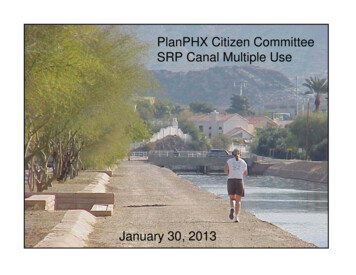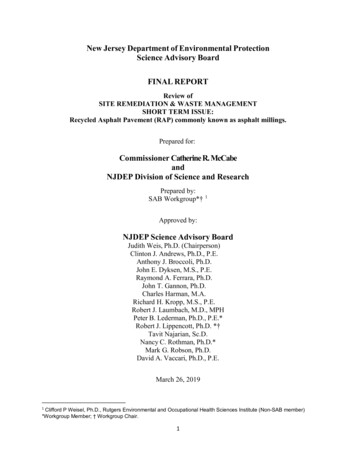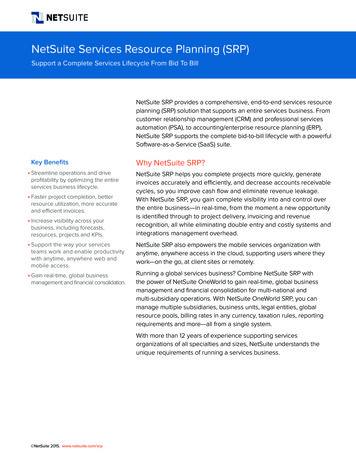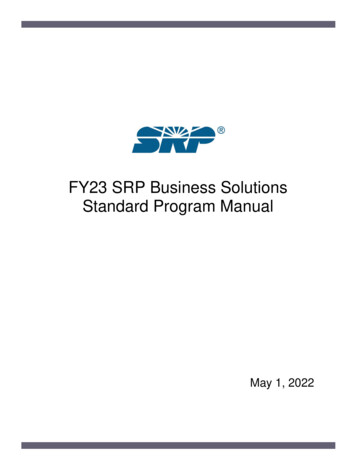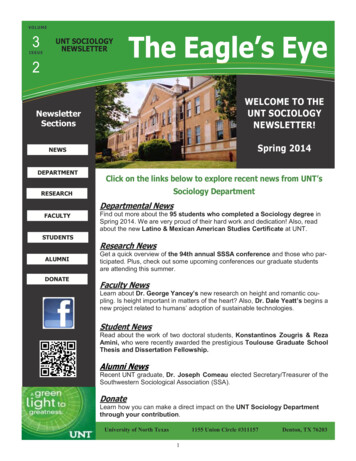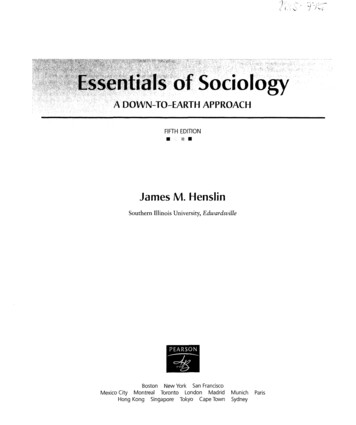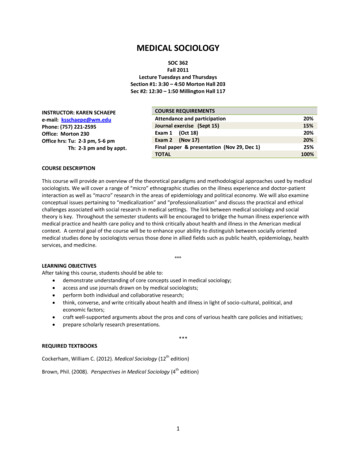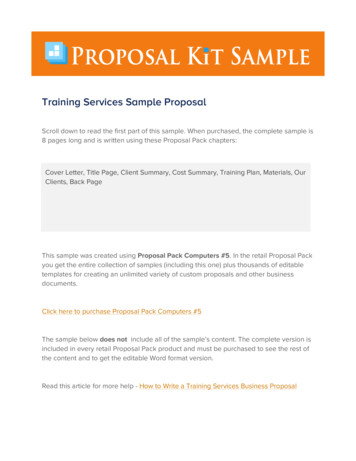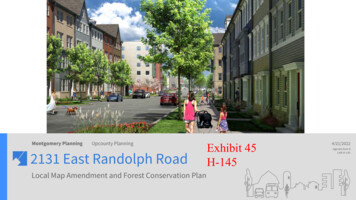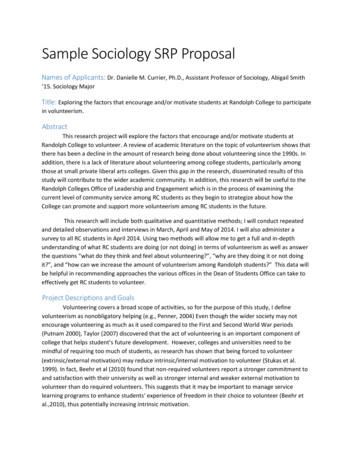
Transcription
Sample Sociology SRP ProposalNames of Applicants: Dr. Danielle M. Currier, Ph.D., Assistant Professor of Sociology, Abigail Smith’15. Sociology MajorTitle: Exploring the factors that encourage and/or motivate students at Randolph College to participatein volunteerism.AbstractThis research project will explore the factors that encourage and/or motivate students atRandolph College to volunteer. A review of academic literature on the topic of volunteerism shows thatthere has been a decline in the amount of research being done about volunteering since the 1990s. Inaddition, there is a lack of literature about volunteering among college students, particularly amongthose at small private liberal arts colleges. Given this gap in the research, disseminated results of thisstudy will contribute to the wider academic community. In addition, this research will be useful to theRandolph Colleges Office of Leadership and Engagement which is in the process of examining thecurrent level of community service among RC students as they begin to strategize about how theCollege can promote and support more volunteerism among RC students in the future.This research will include both qualitative and quantitative methods; I will conduct repeatedand detailed observations and interviews in March, April and May of 2014. I will also administer asurvey to all RC students in April 2014. Using two methods will allow me to get a full and in-depthunderstanding of what RC students are doing (or not doing) in terms of volunteerism as well as answerthe questions “what do they think and feel about volunteering?”, “why are they doing it or not doingit?”, and “how can we increase the amount of volunteerism among Randolph students?” This data willbe helpful in recommending approaches the various offices in the Dean of Students Office can take toeffectively get RC students to volunteer.Project Descriptions and GoalsVolunteering covers a broad scope of activities, so for the purpose of this study, I definevolunteerism as nonobligatory helping (e.g., Penner, 2004) Even though the wider society may notencourage volunteering as much as it used compared to the First and Second World War periods(Putnam 2000), Taylor (2007) discovered that the act of volunteering is an important component ofcollege that helps student’s future development. However, colleges and universities need to bemindful of requiring too much of students, as research has shown that being forced to volunteer(extrinsic/external motivation) may reduce intrinsic/internal motivation to volunteer (Stukas et al.1999). In fact, Beehr et al (2010) found that non-required volunteers report a stronger commitment toand satisfaction with their university as well as stronger internal and weaker external motivation tovolunteer than do required volunteers. This suggests that it may be important to manage servicelearning programs to enhance students' experience of freedom in their choice to volunteer (Beehr etal.,2010), thus potentially increasing intrinsic motivation.
Research has shown that there are clear demographic trends in who volunteers and why(Manning,2010; Petrelka,2006). The clearest trend is gender differences. Although both women andmen report valuing volunteerism (Fletcher 2004), women have a 15.8 times higher odds of volunteeringthan men (Manning 2010) .In fact, in 2012 the U.S. Bureau of Labor reported that women volunteer athigher rates than do men across all age groups, educational levels, and other major demographiccharacteristics. While both genders value the importance of volunteering for humanitarian reasons(Fletcher 2004), there exist differences in the motivation to volunteer between both genders. Petrzelka(2006) found that in later life women are more likely to volunteer as it is a form of “women’s work” andmen are more likely to engage in volunteer work that is reflective of their occupational history. I hopeto explore if this may be an indicator of volunteer activities men and women at the college level chooseto participate in.Although there is not much literature about volunteering and its impact on academics, therewas one study done in 2011 on Boston Colleges Pulse program (Seider 2011) which showed resultspertinent to the proposed study. The Pulse Program is a yearlong optional course which serves as acommunity service learning program that seeks to help participants understand the barriers toeconomic mobility in their community at Boston College. The researchers found that this course had asignificant impact on students’ belief about poverty and inequality, as the students left the programwith a greater recognition of the structural factors that cause these problems. It is also noted that thiskind of knowledge about structural factors derived from volunteering is beneficial in acquiring newskills, future class discussion along with information for writing course assignments (Seider, 2011;Fletcher, 2004).Volunteering is without a doubt a part of college life in the United States(Seider,2011). I hopeto use my research to expand on the literature about volunteering among college students in the 21stcentury which is currently lacking. Trends in volunteering are reflected in one’s social awareness(Knapp 2010 ;Fletcher 2004; Austin 1999), academic (Seider 2011) and sexes (Manning 2010 ;Fletcher2004).While students at Randolph College currently participate in civic engagement and volunteerismat different rates and in different capacities ( such as with a class, sports team, independently, or with aclub/organization as reported by Amanda Denny, Director of Leadership and Engagement) much oftheir motivation to do so is unexplored. The primary goals of this research are:1) to make observations about the levels and type of volunteerism that are currently happening atRandolph College;2) gathering information about the motivations and volunteering patterns at Randolph College;3) analyzing the results to provide suggestions about what volunteerism should look like atRandolph;4) proving practical recommendations to the Office of Engagement and Leadership as they moveforward to increase volunteerism rates and interest in the future.
To gather this data I will use mixed methods of quantitative and qualitative researchinstruments. First, in April, I will administer a survey via Survey Monkey to all full-time Randolphstudents about their demographics, their experience with volunteering/civic engagement, and theirattitudes toward participation in volunteering. I will analyze this data using SPSS, the statistical dataanalysis program. Second, I will utilize various qualitative methods to gain more in-depth informationon attitudes about the meanings of volunteering among RC students. I am currently doing an internshipwith Amanda Denny as Community Service Intern, so I have the opportunity to interact with volunteersand other students doing internships. Thus, I will able to carry out field research. My internshiprequires me to be a part of and facilitate the “alternative spring break” trip, which allows students toserve those in need in Lynchburg or the wider community. I will use this opportunity to conduct fieldresearch and observe differences and similarities of men and women along with other demographicsintent and attitudes toward volunteering. In addition, I will also conduct one-on-one interviews withstudents; I will tape these interviews, have them transcribed, code them (as per sociologicalmethodology), and (with help from Dr. Currier), do analysis to compare with the results of the surveys.(Please see attached appendix of draft of survey and interview questions.)This research is related to both Abigail’s interest in volunteerism among college students andDr. Currier’s commitment to advising internships and encouraging volunteerism among students. Themain action items from Abigail’s internship can be found below:1. Community Service Task Force: examine what community service should look like atRandolph College and work on building the structure of the program for future semesters.2. Creating Community Partnerships: attend meetings with the Director of Leadership andEngagement with local non-profits organizations to determine how Randolph College cancreate a stronger partnership with their organization.3. Volunteer Website: aid in building a webpage that allows students to see what volunteeropportunities are in the Lynchburg and surrounding communities. Contact non-profits forpermission to list them on the website. Goal is to include: Organization name, VolunteerServices Coordinator Name, Contact Information, and List of ongoing project that theyneed help with.4. Publicity of new Programs: help publicize the Office of Leadership and Engagement tostudents on campus as it has taken on a new structure. Promote events taking place thissemester on campus and through social media.Academically, this project will allow Abigail to apply the skills she learned in sociology andpsychology courses. In addition, Abigail will be able to conduct a complete research project, pullingtogether all the skills and theory she has learned as Sociology major. This experience will be beneficialas she plans to pursue a master’s degree in Sociology with a concentration in Student Affairs.The period of summer research is optimal for completing this study. Most of the data collection willbe completed by the end of the spring semester. This is advantageous as Abigail is currently enrolled inSOC 396 (Social Research Analysis), with Dr. Currier and can get ongoing guidance on data collection.The plan for the summer period is below:
1) Completing a literature review (begun in the spring semester) about volunteerism amongcollege students; identify the demographics of volunteers and their level of commitment toactivities; the motivations and lack of volunteerism among different groups along with anyother previous research that speaks to civic enjoyment and college communities.2) Identify aspects of attitudes and behavior gathered from the literature and from Abigail’sspring observation about volunteerism.3) Analyze the quantitative and qualitative data gathered in the spring (survey data andobservation/field research/interviews).4) Conclude a set of recommendations for the college and writeDissemination GoalsThe Sociology Department requires that all majors complete at least 3 internship credits beforegraduating. The department is strongly committed to civic and public engagement, but recognizes thatearning college credit for community work is the most efficient and practical way to engage students inthe community. Thus, the final paper for this project will be included in the annals of the Sociologydepartment along with senior theses. In addition, this work will have the potential to be presented atNational Conference on Undergraduate Research or a variety of regional sociological meetings. Inaddition the results will be available to the campus community and recommendations will be presentedin a detailed report to the Office of Engagement and Leadership in the Dean of Students.External FundingWe should not need any external funding to complete the project.Budgetary NeedsWe do not anticipate any special budgetary needs.Past OutcomesStatement about Student ResearcherThere are two time periods for this project – during the Spring2014 semester, and during the 8-weeksummer research program.In the Spring semester, with my guidance, Abigail will conduct an extensive literature review onvolunteerism and civic engagement. This will include looking at the literature in Sociology, SocialPsychology, Psychology, Social Movements, and any other fields we find pertinent to this topic.After this review is complete, Abigail will assist in designing and administering the surveydescribed in her portion of this application. The survey questions will reflect findings about salienttopics related to volunteerism as well as ask questions designed to fill gaps in this literature. I will trainher on Survey Monkey and she will be responsible for creating the template for the survey itself.Concurrent with the design and administration of the survey, Abigail will conduct observationat various internship sites (accompanying Amanda Denny, using field-note-gathering techniques she is
learning in class) and conduct one-on-one interviews with interns if necessary to glean moreinformation from individuals about motivation to participate in volunteering.During the summer research period, Abigail will assist in the simultaneously analysis of the quantitativedata gathered from the survey and the qualitative data gathered in the observation and interviews.I will be working closely with Abigail on every aspect of this project. She took Soc295(Methods) with me last year and is currently taking Soc396 (Advanced Analysis), so she will bestructuring this project by the social science research guidelines learned in those classes (whichcoincide with the methods she learned in Psychology). During the Spring semester, we will meet atleast once a week to discuss the construction and progress of the project. I will be available to her viaemail or phone during normal day hours. During the Summer Program, we will be in touch daily (eitherin person or by phone) to discuss the analysis portion of this project. I will also guide her closely in thewriting of her analysis.This project will allow Abigail to see how all aspects of a social science research project aredesigned and implemented. She will be partner to every stage of the process, from development of aconcrete research question to the final write-up and presentation of final data analysis. She is deeplyinterested in volunteerism and civic engagement both as a professional (she has completed severalinternships and is currently a Head Resident) and as a person (she is deeply committed to service toothers, as her life trajectory can show). Because of this combination of professional and personalinterest in the project, I believe her participation will give her deep satisfaction at uncovering theanswers to some interesting and perplexing questions (primarily, how to get people to volunteer more)as well as help her clarify her professional goals, or at least what she wants to pursue directly aftergraduating from Randolph.Abigail is well-qualified for this project due to her work in both Sociology and Psychology andher strong academic record. She is a highly motivated student with the ability to multi-task well. Inaddition, she is highly reliable and I know if I give her a task, she will complete it. From her strongacademic success in her methods courses, she is well-versed in data gathering methods and by the timewe have gathered all the data, she will have completed her advanced analysis course (Soc396). She is astrong student and learns quickly, so I am sure that if she encounters any problems, she will nothesitate to ask me or another of her Sociology or Psychology professors for assistance.There is nothing in Abigail’s background that gives me pause regarding her ability tosuccessfully complete this project. She has a lot of both intrinsic and extrinsic motivation, as her trackrecord both academically and personally clearly shows.Statement from the StudentVolunteering has always been something that I have been passionate about since growing up inJamaica, “To whom much is given much is expected” was a household quote that I adopted from earlyon and giving to those in need to alleviate some social issue became something I enjoyed doing. Ittherefore always puzzles me when other fortunate young adults show no interest in contributing theirtime or energy to alleviate social issues. In addition, I feel that my experience in a country where I am
readily exposed to see the difference between rich and poor encourages me to help those lessfortunate than me. This is a reality that most of many middle-class American students take for grantedas some of them are blinded by their privilege. I am therefore interested in this project as it will revealthe attitudes of my peers towards volunteering at Randolph, how to better motivate the students tovolunteering, and provide recommendations for DOS as they move forward with their office of studentaffairs. I feel that the volunteering program at Randolph has the potential to bridge gaps betweenvarious student groups, encourage and strengthen the leadership skills of students, build local andregional partnerships with non-profit organizations, and increase student involvement at Randolph.In addition, this project will allow me to gain valuable research experience and integrateacademic knowledge learned from past courses. I have learned about research in SOC 295 (Researchmethods), SOC 366 (Social Theory), SOC 396 (Social Research Analysis), PSCY101 (Intro to Psych I),Psych 102(Intro to Psych II), PSYCH (Statistics for psychological research I) and I have learned about civicengagement and volunteerism in SOC 310 (Community). I am therefore confident that I will be able touse my skills gained to apply them to a research project. In addition, this research project will allow meto tie together my experience studying sociology and psychology.References:Sax, Linda J, Alexander W Astin, and Juan Avalos. 1999. "Long-Term Effects of Volunteerism During theUndergraduate Years." The Review of Higher Education. 2: 187.Beehr, Terry A., Kimberly LeGro, Kimberly Porter, Nathan A. Bowling, and William M. Swader. 2010."Required Volunteers: Community Volunteerism Among Students in College Classes." Teaching ofPsychology 37, 4: 276-280.Bureau of Labor Statistics, U.S. Department of Labor, The Editor's Desk, Volunteering declines in 2012on the Internet at http://www.bls.gov/opub/ted/2013/ted 20130226.htm (visited February 15, 2014).Rehling, Louise.2000. "Doing Good While Doing Well: Service Learning Internships." BusinessCommunication Quarterly 63, 1: 77-89Fletcher, Thomas D., and Debra A. Major. 2004. "Medical Students' Motivations to Volunteer: A NExamination of the Nature of Gender Differences." Sex Roles 51, 1/2: 109-114Knapp, Tim, Bradley Fisher, and Chantal Levesque-Bristol. 2010."Service-Learning's Impact on College Students' Commitment to Future Civic Engagement, Self-Efficacy,and Social Empowerment." Journal of Community Practice 18, 2/3: 233-251.Manning, Lydia K. 2010. "Gender and Religious Differences Associated with Volunteering in Later Life."Journal Of Women & Aging 22, 2: 125-135.Petrzelka, Peggy, and Susan E. Mannon. 2006. "Keepin' This Little Town Going: Gender andVolunteerism in Rural America." Gender and Society, 2: 236.Penner, Louis A. 2004. "Volunteerism and Social Problems: Making Things Better or Worse?." JournalOf Social Issues 60, 3: 645-666.
R. Putnam, Robert D. 2000. Bowling alone : the collapse and revival of American community / Robert D.Putnam. n.p.: New York: Simon & Schuster, c2000., 2000.Seider, Scott C., Samantha A. Rabinowicz, and Susan C. Gillmor. 2011. "Changing American CollegeStudents' Conceptions of Poverty Through Community Service Learning." Analyses Of Social Issues &Public Policy 11, 1: 105-126.Stukas, Arthur A., and Mark Snyder. 1999. "The effects of mandatory volunteerism' on intentions tovolunteer." Psychological Science (Wiley-Blackwell) 10, 1: 59.Taylor, Trevor P., and S. Mark Pancer. 2007. "Community Service Experiences and Commitment toVolunteering." Journal Of Applied Social Psychology 37, 2: f.Year in d.e.f.g.h.i.RaceWhiteBlack or African AmericanHispanic, non-whiteHispanic, whiteIndianChineseOther AsianNative AmericanOther4.5.a.Major & Minor (if not declared what are you thinking about)GPA1.5 – 1.99
b.c.d.e.2.0-2.492.5-2.993.0- 3.493.5- 4.06.a.b.c.d.How frequently do you volunteer?DailyWeeklyMonthlyYearlyPlease use the definition of volunteering as “the act of serving or offering ones services without pay inreturn” to answer the following questions.7.How do you find out aboutvolunteering opportunities? ( Please choose any that apply)a.ELCb.Professorc.Friendsd.Club or organizatione.Newspaperf.Social Mediag.Parentsh.Other8.a.b.c.d.e.f.g.h.Where do you volunteer? (Please choose any that apply)At schoolOff campusOnlineSportsHuman RightsAnimalsRacial IssuesOther9.a.b.c.d.e.Why do you volunteer? (Please choose any that apply)Class creditEnjoymentFor a club or organizationSomething to put on my resumeSport requirement
f.g.Career stimulatedOther10.What topics do your volunteering activities usually center on? ( Please choose the top threeanswers) a.Childcareb.Povertyc.Businessd.Children Rightse.Housingf.Environmentalg.OtherPlease use this alpha scale below to answer the statements in 11- 17a.Alwaysb.Most of the timec.Oftend.Sometimese.Rarelyf.Neverg.Not 4.You enjoy volunteering.You use information gathered from volunteering in the classroom.You feel that you will use information gathered from volunteering for the rest of your life.You feel that you will use information gathered from volunteering in future jobs.You feel that you would use information gathered in relationships with other people.You feel that volunteering strengths your awareness of your community.You feel that volunteering increases your knowledge about the world.Volunteering allows me to gain a new perspective on things.Volunteering makes me feel like a better person.Volunteering helps me to understand concepts discussed in the classroom.Volunteering in college is a new activity for me.Volunteering is helpful in attaining my future goals.Volunteering has helped me figure out more about what I want to do with my lifeVolunteering has helped me clarify my values, morals and ethics.To gather more information on this topic the researcher would like to conduct interviews. If you arewilling to participate please provide your email address below so that the researcher may contact you.Thank you. Email:
Interview1.Are you currently volunteering?2.Where are you volunteering? How long have you been volunteering?3.What do you dislike/like about it so far?4.What have you enjoyed the most about your present or past volunteering experiences?5.Do you usually volunteer by yourself or with others? Why?6.Have your volunteering experiences been school related or other?7.What group of disadvantage people do you usually volunteer with the most?8.Do you find yourself referencing volunteering experiences in class?9.Does volunteering inform you about things regarding your community that otherwise youdidn’t know?10.Does volunteering inform you about information regarding the world that otherwise you didn’tknow?11.Do you find that volunteering offers you a new perspective on things? Explain?12.Do you see yourself volunteering in the future?
Sample Sociology SRP Proposal Names of Applicants: Dr. Danielle M. Currier, Ph.D., Assistant Professor of Sociology, Abigail Smith '15. Sociology Major Title: Exploring the factors that encourage and/or motivate students at Randolph College to participate in volunteerism. Abstract This research project will explore the factors that encourage and/or motivate students at
